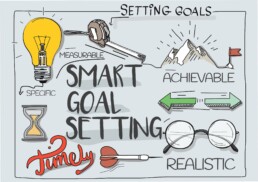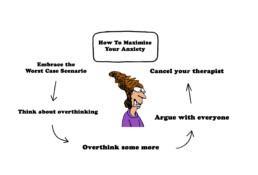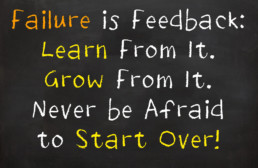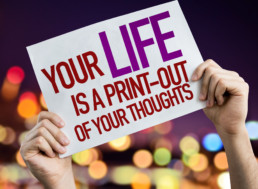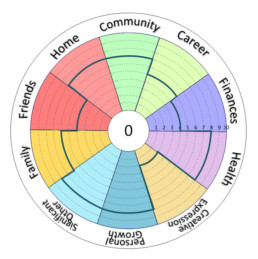Goals vs. Resolutions
Are you a person who makes a list of resolutions at the start of a new year? Do you carry through with them or find that they have fallen by the wayside?
The problem with resolutions is there is little to define them except knowing what it is you want (or don’t want).
Goals, on the other hand, give you a framework to make it more likely you will end up with what you had intended. I’m sure by now you’ve heard of SMART goals. It has become a bit of a buzzword.
Let’s say you want more time in the evenings to relax.
First, your goal must be Specific. More and less are not specific words. If you want “more” free time, you need to define what that looks like to you.
Next is Measurable, this is part of being specific. How much time do you want for evening relaxation? 20 minutes? Two hours?
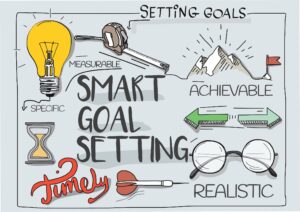 A is for Achievable. It is not likely that you can set aside two hours every evening for relaxation; the 20 minutes, however, is much more achievable.
A is for Achievable. It is not likely that you can set aside two hours every evening for relaxation; the 20 minutes, however, is much more achievable.
Is it Realistic? Given your life and schedule, what would you have to give up or do much faster to carve out two hours of free time every evening?
Finally, Time sensitive. When will you begin doing this? Frequently, goals are something that we need to work up to. Maybe you start with five minutes and increase steadily from there. At what point will you reliably have that desired amount of relaxation time?
Bonus attribute: Accountability. While not required for a SMART goal, it makes success more likely – and sometimes easier. Is there someone, personal or professional, who can check in with you weekly to make sure you’re keeping up?
There you have it—a formula for success. And, since every day is the first day of a new year, you do not need to wait for January to set new goals.
- Sydney Metrick
Overwhelmed?
Do you ever feel overwhelmed? There’s just too much happening at once. You have bills to pay, appointments to make, places to go, organize your house and maybe your office, assignments due, people to take care of, and so on.
 Or have you ever been in a restaurant full of people talking at other tables, and a musician singing loudly in the background?
Or have you ever been in a restaurant full of people talking at other tables, and a musician singing loudly in the background?
What you might be experiencing is sensory overload. When I’m trying to write a newsletter, and someone is mowing their lawn nearby, and a large truck is rambling up the road, and my husband is trying to talk to me, and the phone is ringing, and my sweater itches…you get the picture—sensory overload.
Overwhelm and overload are both too much.
When overwhelmed, take control of your schedule by deciding what’s important and what can wait.
With overload, if you can cut out distractions – put the phone on silent, put on a comfy sweater – do. A pair of noise-canceling earphones can do wonders with overload.
Life happens, there’s no controlling that. It’s up to you to realize it’s normal and find solutions that work for you.
- Sydney Metrick
Reviewing 2022
Those of us with ADHD or who are in some way not neurotypical, tend to look at what we “should have done” or how we “should have been.” Rather than “shoulding” yourself over things in the past, why not learn from it?
Give yourself some time to review the past year. Look at all your wins, all the things that went well, all you’re proud of. Give yourself a much-deserved pat on the back, do your happy dance, or otherwise celebrate the good.
Also, look at the things that have fallen into your “should” category. Think about what you could do differently in a future similar situation that could lead to successes. Avoid self-criticism, you are teaching yourself how to be better!
With what you now know of your strengths and challenges, what have you learned that can make 2023 a better year for you? For example:
- If you struggle with inattention, what is one thing that can help you with focus?
- If impulsivity is a problem, what can the little voice in your head have as a mantra to slow you down?
- Overwhelmed? Can you practice prioritizing and blocking time for important things?
There is no failure as long as it brings you closer to a future success.
Lazy?
Accompanying the hot weather of recent weeks, the little voice in my head that tells me to put things off has gotten very persistent. I was soaking some tomatoes to detoxify them and planned to soak apples afterward. That’s when that sneaky voice popped up and said, “you can soak the apples later.” Fortunately, the sensible part of my thinking caught that. Soak the apples later? All I have to do is take the tomatoes out of the bowl and put the apples into it.
As I lay on the couch reading and waiting for the dryer buzzer to go off, the load soon dries. The lazy voice suggested the clothes could wait until I’d gotten up for something more important, like a glass of water. If I did that, I’m sure the voice would come up with something new when I did get up.
That inner voice, usually known as the inner saboteur, is all about “later.” As if later things will be easier or there will magically be an increase of motivation. I admit I cannot see the future. And some tasks could be easier at a different time of day and motivation does have a way of coming and going. All that said, even when vital, I am rarely motivated by laundry.
While that little voice never goes away, it is possible to recognize it and ignore it. Or, if you don’t want to be rude, you could acknowledge it and then choose not to take its advice. When you pay attention to what your voices are telling you, seeing why you’re not getting things done is much easier. Also, when you pay attention, you take yourself off autopilot and allow your sensible part have a say too.
-Sydney Metrick
Whose Story Are You In?
It’s easy to say “be yourself,” but quite another thing to know who you truly are. You may use your name, relationship status, career, ethnicity…or you may break down the description into behaviors. We all have many stories we use to define ourselves.
People I coach often say “I’m a person who—
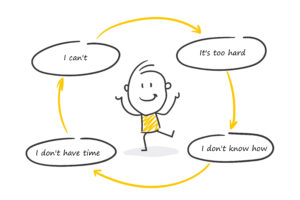 is always late
is always late- is disorganized
- can’t catch up
- procrastinates
- has a million projects and never finish any
- can’t ever find my keys
You get the drift.
It's important to become aware of the story you tell about yourself. As Henry Ford said, “Whether you think you can, or you think you can't--you're right.” So, if you’re caught in the vicious circle of “I can’t,” “it’s too hard,” “I don’t have time,” and so on; is that really the story you want to define you?
 I read about a “virtuous circle,” in which you focus on the positive and change to a self-affirming mindset. Imagine how much nicer it would be to be “caught” in a circle of “I can,” “it’s easy,” “I have all the time I need.”
I read about a “virtuous circle,” in which you focus on the positive and change to a self-affirming mindset. Imagine how much nicer it would be to be “caught” in a circle of “I can,” “it’s easy,” “I have all the time I need.”
The life you lead is based on the stories you tell about yourself. Granted some of the stories may have been learned over the years, but if the story doesn’t give you the life you want, you get to rewrite it.
-Sydney Metrick
Avoiding “Worse Case Scenarios”
Do you ever put off something you need to do because you’re thinking doing it will be difficult or unpleasant in some way? Your mind is attempting to protect you from the possibility of failing by projecting the “worst case scenario” as the likely outcome.
That story in your imagination is powerful enough to keep you from doing something you actually need to do. As the Temptations sang:
“A cozy little home out in the country with two children, maybe three.
I tell you; I can visualize it all. This couldn't be a dream, for too real it all seems.
But it was just my 'magination, once again.
Running away with me.”
Since what you imagine can seem so real, why not use it to picture positive experiences and outcomes?
Here’s one way to do that. Let’s say your task involves getting your financials ready for your tax preparer. In previous years this task has been a painful slogging eating up days of your life. Why on Earth would your imagination push you towards avoidance or procrastination?
 One solution is to imagine how wonderfully easy the task will be by approaching it in a different way. I frequently suggest people take on big tasks in little bites. So dedicate, say, 30 minutes a day for a week to get everything together.
One solution is to imagine how wonderfully easy the task will be by approaching it in a different way. I frequently suggest people take on big tasks in little bites. So dedicate, say, 30 minutes a day for a week to get everything together.
This is a two-pronged attack:
- You are using your imagination to see this job as an easy thing. And 30 minutes of any task is doable.
- Getting a chunk of work done on a daily basis gives you a feeling of accomplishment which can make the next day’s 30 minutes easier – and validating your imagined experience!
You can already imagine how great you’ll feel when you totally complete the work; why not use that tool to feel good about the process? You can enhance the experience in any way you want.
Step into that picture and claim it as real.
The more you start thinking positively, the easier things become.
- Sydney Metrick
Avoiding Holiday Overwhelm
Who, what, when, where, why, how. I bet you’ve heard this list before. Maybe it was about news reporting or project management. As it happens, these are the questions to consider when making the decisions that will help you avoid holiday overwhelm.
Let’s review them.
-

If this is how the holidays make you feel, maybe it is time to think about how you approach the holidays. Who do you want to, or really have to, spend time with this holiday season?
- What would be the possible occasions for the get-togethers or gatherings?
- When, if not an actual holiday dinner, would be most feasible and even enjoyable to connect with this person or these people?
- Where would the get-together take place? Is travel necessary? Must you be the host with all the required work?
- Why are you either planning or being talked into doing this? What’s the big picture? Is it about spending time with friends or family? Is this what makes the most sense for you as the year draws to a close?
- How will you make sure you have prioritized the most important get-togethers? And how can you set boundaries around how much energy you expend in planning, participating, and possibly recovering?
Even people we love can cause stress this time of year. To get the most out of your visits, make sure to maintain the boundaries you put in place to keep yourself happy through this “joyous” season.
The “who” of the holidays is stressful enough. However, if you plan on giving gifts, I suggest you walk through that too.
As your Facebook feed will probably suggest at some point, there is no need to go broke or crazy because of the holidays.
-Sydney Metrick
It's Not You, It's Your Brain
Does the number of thoughts, tasks, and commitments in your life feel overwhelming at times? Even when you know what to do first, do you wonder what to do first?
Do you sometimes worry that you forgot to do something, or how to do the something you remembered?
Have you had trouble meeting deadlines?
Are you sometimes concerned that what you’ve done isn’t good enough or even actually done?
 Are your first thoughts about a project more likely the “worse-case scenario” than “yeah, I’ve got this.”
Are your first thoughts about a project more likely the “worse-case scenario” than “yeah, I’ve got this.”
If your answer to any of these questions is yes, you likely have worries. All these demands and your thoughts about them can lead to anxiety. Now for those of you with ADHD, anxiety is likely to be present along with your other symptoms. You might feel stressed more easily, have sleep issues, find it difficult to get things done, and even find your self-esteem is impacted.
Worry anxiety on top of ADHD anxiety is no fun.
The not so good news is that anxiety can be disabling. The better news is two-fold. First, when things feel overwhelming, you can break projects and tasks down into small steps and use the steps to design your day (get help if you can’t seem to do it yourself). Second, it is OK to let go of “should,” perfection, and comparisons to others; better than OK, it’s healthy.
Just keep in mind, it’s not you, it’s your brain. The anxiety may be due to the difference in function of two neurotransmitters, dopamine and norepinephrine. Awareness and developing tricks, tools, and habits can reduce anxiety.
- Sydney Metrick
What Not to Expect
Does this ever happen to you? You compare your work, or your looks, or your accomplishments to someone else’s and feel they are in a “better” place than you are?
There are two problems inherent in this kind of thinking. One is that since you are unique you have your own path to travel. Where your path has many curves, whoever you compare yourself to may be in a straight segment of theirs. Someday the opposite may be true.
The other related problem is having expectations. These typically have the word “should” involved. For example, thinking you should be able to maintain a schedule, or you should be able to estimate how long a task will take, or you should have remembered a task or appointment you’d committed to.
 I’m not a fan of should. When you think shouldn’t have done something you criticize yourself. When you think you should, but aren’t likely to, you’re putting pressure on yourself. It’s a guilt word. In the first case, if you didn’t do something you’d planned to do, look at why and what the solution might be. In the second case, either A) do what you intend, or B) realize you aren’t going to do it and that’s okay for the time being.
I’m not a fan of should. When you think shouldn’t have done something you criticize yourself. When you think you should, but aren’t likely to, you’re putting pressure on yourself. It’s a guilt word. In the first case, if you didn’t do something you’d planned to do, look at why and what the solution might be. In the second case, either A) do what you intend, or B) realize you aren’t going to do it and that’s okay for the time being.
Expectations lead to disappointment. If, by chance, you have ADHD you are likely to have problems with executive functions such as sustaining attention, planning, organizing, remembering details, managing time, or staying on task.
It might take you longer to start and longer to finish a task or project. You might get distracted by things outside or by your own thoughts. As a result, you might often feel overwhelmed which can lead to anxiety or depression.
So, if you do have an attention difference, take the time to find your own style and get comfortable with it. You will be more productive in the long run. Expecting that you’ll be like anyone else, well…
Finding your own style is important. Imagine how much easier life would be if you know how to manage your schedule, estimate the time a task will take, and remember your appointments. Helping people do this is what puts the heart into coaching.
-Sydney Metrick
What, Me Worry?
 There’s a good chance that your worry and anxiety have gone up a few notches this past year. In addition to the overwhelm you may experience in your personal life, we have a pandemic in an election year, and terrible things happening climate-wise in various parts of the country and the world.
There’s a good chance that your worry and anxiety have gone up a few notches this past year. In addition to the overwhelm you may experience in your personal life, we have a pandemic in an election year, and terrible things happening climate-wise in various parts of the country and the world.
Though you still may take action to make a difference, there’s only so much you can do on a grand scale. Your greatest power lies in your personal life, where you can change YOUR beliefs and YOUR habits around dealing with everything that is going on.
Unfortunately, some of the stories you tell yourself about who you are and what you can truly achieve come from misguided attempts to keep you safe. Based on fears and insecurities your inner saboteur will say, “you can’t,” “you’re not,” “you shouldn’t” and flood you with feelings that prevent you from doing and being what’s important for you.
When you repeatedly tell yourself something is difficult, you don’t have time, or anything that diminishes you, it becomes your reality. To create a different reality, interrupt that inner saboteur and tell yourself something different.
Catch yourself. Change your words. Change your story. Start to change your life.
Need help? Here I am.
-Sydney Metrick
Designing an Uncertain Future?
Have you heard anyone talk about “when things return to normal” or possibly “we are moving to ‘a new normal’”? Normal is defined as usual or typical.
Normal is a problematic concept in a number of ways because it is “in the eye of the beholder” and influenced by other problematic concepts like:
- Habits
- Self-concept
- The future
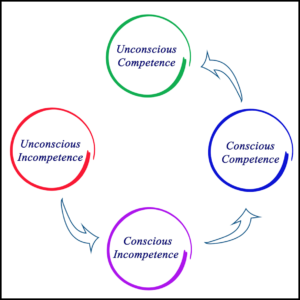 When you do or think something repeatedly over time it becomes a habit. You may recall the four-step grid for developing a new habit. It starts with the awareness that what you are doing isn’t working for you in the present. That’s Unconscious incompetence. Working on a new behavior can be challenging—conscious incompetence. As the new behavior begins to become a regular activity it’s conscious competence. Finally, it’s so ingrained that you become unconsciously competent. With habits, normal is generally unconscious.
When you do or think something repeatedly over time it becomes a habit. You may recall the four-step grid for developing a new habit. It starts with the awareness that what you are doing isn’t working for you in the present. That’s Unconscious incompetence. Working on a new behavior can be challenging—conscious incompetence. As the new behavior begins to become a regular activity it’s conscious competence. Finally, it’s so ingrained that you become unconsciously competent. With habits, normal is generally unconscious.
Your self-concept is tied to beliefs and habits. You hold beliefs about yourself that influence your actions. As your actions or behaviors change your image of yourself shifts. How you previously saw the way you were as normal for you might be quite different with new behaviors.
Your future exists in your imagination. We also have collectively imagined futures, like space colonies and cures for diseases. These imaginings can become goals and perhaps come to pass. But you never really can predict what, if, or when.
The “solution” for your definition of normal is to imagine what you’d realistically like life to look like over the next months, or years, and do what you can to make that happen.
-Sydney Metrick
Who’s Running your Life?
Do you have any “should do’s” interrupting your days? “Shoulds” are typically things around health, e.g. have a healthier diet, or exercise more. They may involve organizing, such as “I should put away the laundry, clean out the refrigerator, get rid of all those emails in my inbox.”
 One psychology model suggests we have three ego states: parent, adult, and child. The parent state, associated with the likes of teachers and bosses as well as parents is responsible for the “shoulds”. The parent state diminishes your authority and often is the source of procrastination. In fact, a resistant childlike response may take over.
One psychology model suggests we have three ego states: parent, adult, and child. The parent state, associated with the likes of teachers and bosses as well as parents is responsible for the “shoulds”. The parent state diminishes your authority and often is the source of procrastination. In fact, a resistant childlike response may take over.
This is most likely if your internal parent voice is critical.
Your child state, on the other hand, can often accomplish things by making them fun or interesting. Finally, your adult state does what needs doing because it makes sense.
The inner adult is likely to have the most developed critical thinking skills. For example, your inner adult would like to improve your diet for specific reasons. For those reasons, you can identify the appropriate healthier diet for you, as well as a realistically put it into place. In time, your inner adult would evaluate how the plan is working and make any needed changes.
Working on the theory that everything is there for a reason, the inner parent does have value. The parent state represents the rules that we’ve adopted as guides. Sometimes those rules can be critical, but it is also where our morals and confidence stem from.
- Sydney Metrick
We’ve Been Forced to Change
Having to shelter in place drives home Newton’s first law, known as the law of inertia. You may wonder how this applies to you. The law says an object at rest stays at rest and an object in motion stays in motion – with the same speed and in the same direction unless something pushes or pulls it. Basically, as objects, we don’t change our behaviors just because it’s a good idea. It might make sense to change, but oh the effort you feel you must expend.
When you don’t seem to have any choice in the matter, most of you will comply and find ways to make changes. You might do it kicking and screaming, or you might get creative. The bottom line is you can, and you do, learn to do things differently. If the past ways are no longer working, you get to look for ways to create a different and even better present and future.
 This is applicable across the board. No need to adhere to old habits that don’t work just because you’ve always done things that way, and it’s easier to just follow that beaten path.
This is applicable across the board. No need to adhere to old habits that don’t work just because you’ve always done things that way, and it’s easier to just follow that beaten path.
Think of a change you say you want to make. What’s stopped you? Lack of time, knowledge, remembering, fear of failure, a story about how difficult it will be? Is the change really important to you? On a scale of zero to ten, how important?
If the new behavior feels really important and you have the time, materials, and/or tools what else do you need? Commitment? Accountability? Knowing what the first step is and how you will take it?
Guess what? It’s all in your head! You know the terms “live as if,” and “fake it ‘til you make it”? Well, those things work because the brain sees imagined truth just like truth.
Here’s a way to start:
- Imagine the time in the near future when your desired change is in place and you feel great.
- Spend a few minutes daily (or throughout the day) imagining yourself doing the things that make the change happen and then being in that imaginary future in which it has occurred.
The more you practice mentally, the easier it becomes in actuality. In fact, the mental practice will help make the actuality happen.
-Sydney Metrick
Failing Successfully
Did you know that failure is an “Essential Prerequisite” to success? At least, that’s what scientists who studied a massive amount of data concluded and Scientific American reported on.
Chances are you’re familiar with Kentucky Fried Chicken, now known as KFC. Did you know that Colonel Harland Sanders, the Kentucky Colonel whose face graces every “finger lickin’ good” bucket of chicken, was nearly a lifelong failure? At age 65 he took a stand for his famous chicken recipe and was rejected by over 1000 restaurants before it finally sold. The rest, as they say, is history.
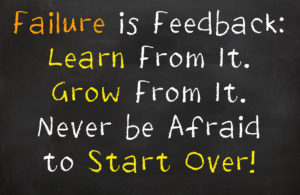 Jim Carrey, J.K. Rowling, and Oprah Winfrey are others who experienced failure and hardship before making it. It wasn’t luck that brought them to their successes. Success comes from several factors: learning from what works and what doesn’t, making corrections, and committed perseverance. You may have previously read one of my favorite quotes by John Assaraf, “If you’re interested, you’ll do what’s convenient; if you’re committed, you’ll do whatever it takes.”
Jim Carrey, J.K. Rowling, and Oprah Winfrey are others who experienced failure and hardship before making it. It wasn’t luck that brought them to their successes. Success comes from several factors: learning from what works and what doesn’t, making corrections, and committed perseverance. You may have previously read one of my favorite quotes by John Assaraf, “If you’re interested, you’ll do what’s convenient; if you’re committed, you’ll do whatever it takes.”
Failure gifts us with lessons and direction. Make sure your failures don’t lead you to a seat on the pity pot. When an attempt fails, figure out how and why, don’t be afraid to ask for support, and try again. That’s something else those scientists realized, success became more likely – and came more quickly – to those who got right back to work. That seat on the pity pot is more than unproductive, the longer you sit on it the more likely your next attempt is also going to fail.
Why Change Your Mind?
You might change your mind with some frequency, but changing your mindset can change your life. A mindset consists of the beliefs and attitudes that lead to your successes or lack of. I’m talking about what you believe about your self—who you are, what you deserve, what you can or can’t do, have, or be.
We are what we think. Are the words of your thoughts keeping you in a cage or setting you free?
 The stories you tell about yourself, or hear in your head, are just stories. “It’s too hard,” or “I don’t know how,” or “I never” are just some of the tales that prevent successes. The simple solution is watching out for negative language and switching it. For example, when I taught evening classes, I’d hear myself saying, “I have to teach tonight.” That made the thought of teaching feel like drudgery. Training myself to replace “have to” with “get to” made all the difference.
The stories you tell about yourself, or hear in your head, are just stories. “It’s too hard,” or “I don’t know how,” or “I never” are just some of the tales that prevent successes. The simple solution is watching out for negative language and switching it. For example, when I taught evening classes, I’d hear myself saying, “I have to teach tonight.” That made the thought of teaching feel like drudgery. Training myself to replace “have to” with “get to” made all the difference.
Watch out for the ways you may minimize yourself, others, and possibilities with language.
Every sentence that starts with “Don’t” – regardless of how encouraging you intend to be – is limiting. Probably because the brain frequently ignores negative words. So, when you tell yourself, or someone else, “Don’t give up!” the brain is most likely going to hear “Give up!” And what’s that going to do your confidence?! “You can do it,” and “keep going” are much more inspirational.
Changing language takes practice. Just keep at it, remember it is a process, you are getting better every day, and I’m certain you can do it!
-Sydney Metrick
How Does Your Wheel Roll?
Life balance. What does that even mean? Can you have a balanced life? If so, how?
First, how’s your life at the moment? There are several assessments to see if you are in or out of balance. Many coaches use a tool called the “Wheel of Life” for this.
 Most of us express our thoughts, time, and energy in eight to ten different areas. The “Wheel of Life” gives you a way to rate your life in each of these areas. Personally, I use the following categories with my clients:
Most of us express our thoughts, time, and energy in eight to ten different areas. The “Wheel of Life” gives you a way to rate your life in each of these areas. Personally, I use the following categories with my clients:
- Friends
- Personal Growth
- Family
- Community
- Health
- Career
- Home
- Finances
- Significant Other
- Creative Expression
Feel free to substitute school for career, or whatever other changes will accurately reflect the key components of your life. Once you have your categories, assess your current level of satisfaction in each area on a scale of 1-10. Your consideration is based on what that category means to you. For example, in the Significant Other category: you have a significant other and it’s a good relationship, so you give yourself a 9; or, you don’t have a partner and don’t want one, that can also be a 9. But if you’re not happy with your relationship, perhaps you give yourself a 3 or 4.

Once you have all your numbers you can see if you’re balanced, such as all numbers fall between 7 and 9, or all between 4 and 7. Both ranges show balance, but only that first range shows satisfaction. Any area that indicates a satisfaction level of five or less would benefit from attention to bring it up. This means setting goals, creating plans to achieve them, scheduling and fulfilling action steps.
Do not expect to maintain balance once you reach it. Life has a way of changing and you can get out of balance without noticing. Personally, I re-do my wheel at the turn of every season.
-Sydney Metrick

